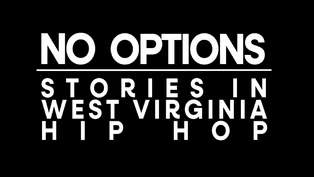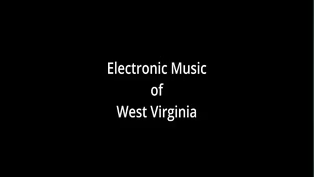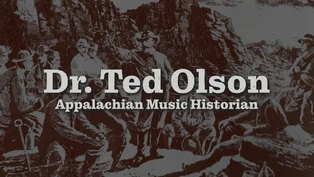Mountainthology
Dr. Ted Olson - Appalachian Music Historian
Clip: Season 2025 | 8m 48sVideo has Closed Captions
Extended version of Dr. Ted Olson - Appalachian Music Historian.
Extended version of Dr. Ted Olson - Appalachian Music Historian.
Problems playing video? | Closed Captioning Feedback
Problems playing video? | Closed Captioning Feedback
Mountainthology is a local public television program presented by WVPB
Mountainthology
Dr. Ted Olson - Appalachian Music Historian
Clip: Season 2025 | 8m 48sVideo has Closed Captions
Extended version of Dr. Ted Olson - Appalachian Music Historian.
Problems playing video? | Closed Captioning Feedback
How to Watch Mountainthology
Mountainthology is available to stream on pbs.org and the free PBS App, available on iPhone, Apple TV, Android TV, Android smartphones, Amazon Fire TV, Amazon Fire Tablet, Roku, Samsung Smart TV, and Vizio.
Providing Support for PBS.org
Learn Moreabout PBS online sponsorshipTo be an effective music historian, you have to ask a lot of questions.
You have to have a not only a love for music, but a curiosity about where it came from, where did it come from, who made it, who?
Who created it?
What about the artist?
Do you know the person who becomes known as performing something?
What is their story?
Where did they learn to make music and what inspired them?
And then large cultural questions behind that.
You know, what is i about Appalachia, for example, that produces a whole genre of traditional ballads?
I know, you know, I've always loved music, but I've always been that kind of music listener who asks questions about the music.
When I was about four years old, dating myself here, but when I was about four years old, a box set was issued.
One of the early box sets of folk music.
My mother purchased it.
It's called the Folk Box.
It changed my life.
It was a box set that influence an entire generation of artists.
It was out of print for years.
I hope to bring it back in print as one of my projects.
That record was on the shelf as a kid, and I listened to it constantly.
I was introduced to artists like Doc Watson and Judy Collins and Phil Oake and others by means of that box set when I was just a toddler, basically.
The liner notes for that box set were written by a gentleman named Robert Shelton.
And so basically I was reading the words of Robert Shelton, this great writer, as a as a kid trying to figure ou what he meant when he critiqued and analyzed the music on that record.
That got me to ask a lot of questions.
That was the other music I was listening to beyond that album.
Most of those records came wit inserts containing liner notes.
I read those liner notes when I was old enough to read and understand them.
I asked similar questions as the writers of those liner notes asked.
I ask new questions which weren't dealt with in those liner notes, and it led me to a lifelong kind of habit, I suppose you could say, of engaging with the stories behind the music I was listening to.
And once I started to hear musicians out in the field say, across Appalachia, I just carried forward with me that same propensity to engage with the music by asking questions and talking with the artists to learn from them, their feelings about the music their stories about the music.
It's a lifelong process of of understanding, knowing and sharing.
So yeah, it's a it's a ongoing process of engagement with music history.
And some of that histor is quite recent, but all of it is about making the music accessible to the public.
Once I find the music, then I convert them into projects.
And in more recent years, it has definitely involved the creatio of a lot of documentary albums.
And those documentary album bring the musical performances themselves to the public alongside interpretation of that music, wherein I wor as both an editor and a writer.
In the role of editor I bring existing texts together and convey them into book or liner notes that are included with the recordings, and then in other cases, I'll write original pieces so much as I bring the stories into the classroom by means of the box sets, I bring those stories into people's homes and into their lives, and then they participat in the celebration of that music in the form of of listenin and learning from the box sets.
I. Here we are in Johnson City, Tennessee, at the site of the Johnson City Sessions.
There's a sign over here put up by the city of Johnson City to commemorate the Johnson City sessions.
So what are the Johnson City sessions?
They were early recording sessions held in Appalachia in 1928 and 192 by this gentleman, Frank Walker, who was a pioneer of recorded sound.
Those records, made in 1929, in the Johnson City Sessions, are considered some of th finest recordings of all time.
Music.
We're at the site of the 1929 Johnson City Sessions.
In 2013.
I was part of a group to celebrate the Johnson City sessions through the release of the box set.
We were trying to find ou where the 29 sessions were held, but it had never been documented by the record company.
We were able to determine that it was in this building.
Loaves and fishes the congregation in 2013, when we told them tha there building held historical relations to early country music, they were surprised.
And here's the Stat of Tennessee historical marker commemorating Richard Town Records, which was the first independent record label to record bluegrass music.
The person who was responsible for Richard Town Records was James Hobart Stanton, and had a very interesting way to market records.
He drove them aroun from county fair to local yard, where people were hanging out, and he was marketing these albums from the back of his car.
He would open the trunk an people would walk up to the back and choose a record and buy it.
From there.
Appalachian music is important to the world.
And what is Appalachian music?
It's the music of Appalachian people.
It's diverse.
I try not to have preconceived notions of what I'm looking fo when I study Appalachian music.
A few years ago, I was asked to edit the music section of the Encyclopedia of Appalachia, which is a book on many on th shelves of many libraries today, and the Encyclopedia of Appalachian Music section gave me the opportunity to truly explore Appalachian music as a, from a multiplicity of perspectives.
And so we have stories in there about classical musicians from Appalachia, jazz musicians from Appalachia, blues musicians from Appalachia, you name the genre.
There's a connection to Appalachia.
Appalachia has a diversity of musical traditions, and I think they're all worthy of study.
And I really done my best to, keep my mind open and and explore different sound and create different projects.
And happily, I think people all over the world are open minded about it.
So I hop I played a small role in that, but it's many other people have played a role.
It's an ongoing process, fighting against stereotypes.
Sometimes.
But ultimately the proof is in the culture, and the cultural stories are so magnificent that they tell themselves, all we need to do is get out of the way of the stories and make them available to other people.
No Options Stories in West Virginia Hip Hop
Video has Closed Captions
Clip: S2025 | 9m 24s | Extended version of No Options Stories in West Virginia Hip Hop (9m 24s)
Electronic Music Of West Virginia (Full)
Video has Closed Captions
Clip: S2025 | 9m 15s | Extended version of Electronic Music Of West Virginia. (9m 15s)
Dr. Ted Olson - Appalachian Music Historian
Video has Closed Captions
Clip: S2025 | 8m 48s | Extended version of Dr. Ted Olson - Appalachian Music Historian. (8m 48s)
Providing Support for PBS.org
Learn Moreabout PBS online sponsorship

- News and Public Affairs

Top journalists deliver compelling original analysis of the hour's headlines.












Support for PBS provided by:
Mountainthology is a local public television program presented by WVPB



